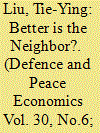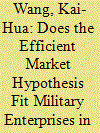| Srl | Item |
| 1 |
ID:
168860


|
|
|
|
|
| Summary/Abstract |
This study applies the Sequential Panel Selection Method (SPSM), to investigate the convergence properties of the military expenditure of the North Atlantic Treaty Organization (NATO) during the period of 1990–2015. Compared to the traditional methods, SPSM considers fundamentally general spatial homogeneous and heterogeneous relationships with countries and examines the evolution of military expenditure. We find that four-fifths of NATO member countries have been convergent with the UK, but no country’s military expenditure is convergent with the US. This means that there is no significant linkage effect in the US for NATO military expenditure. While they are allies of the US, the majority of NATO member countries’ military expenditures are consistent with UK military expenditure. The main reasons are due to the geographical space layout and the international relationship convergence. The results indicate that more than four-fifths of NATO member countries have been coordinated with convergence theory and spillover effect.
|
|
|
|
|
|
|
|
|
|
|
|
|
|
|
|
| 2 |
ID:
170222


|
|
|
|
|
| Summary/Abstract |
This paper investigates whether the efficient market hypothesis (EMH) fits the Chinese military market using the Sequential Panel Selection Method (SPSM) and the Panel KSS unit root test with a Fourier function. We obtain evidence for structural shifts and non-linearity in the stock prices of the military industry in the Chinese stock market. Because sharp shifts and structural breaks are taken into account, the unit root hypothesis for most listed companies is rejected. Our result suggests that the Chinese military market is inefficient because of such factors as defense reforms, friction in the stock market, and irrational investors. We provide investment implications to enable future stock price movements to be predicted based on past behavior and enable trading strategies to be developed to earn abnormal returns. Meanwhile, Chinese defense enterprises should continue to implement industrial reforms, change their bureaucratic culture, and develop a market-oriented workforce.
|
|
|
|
|
|
|
|
|
|
|
|
|
|
|
|